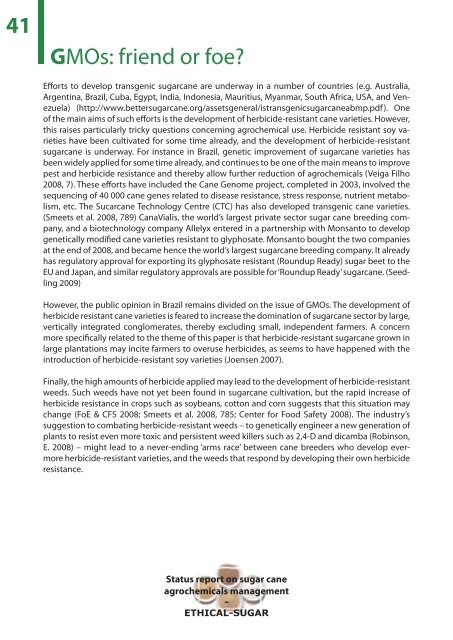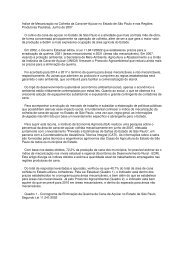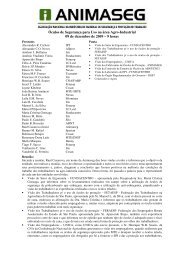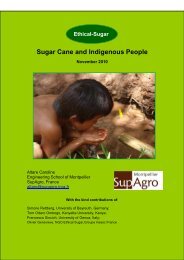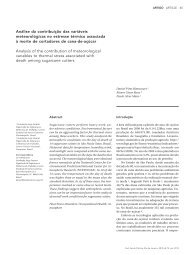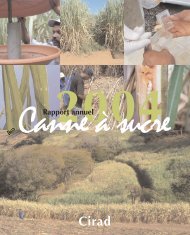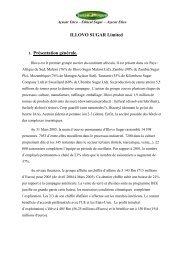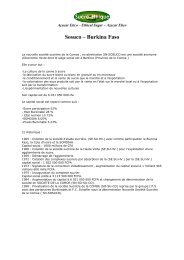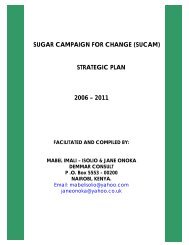Status report on sugar cane agrochemicals ... - Sucre Ethique
Status report on sugar cane agrochemicals ... - Sucre Ethique
Status report on sugar cane agrochemicals ... - Sucre Ethique
Create successful ePaper yourself
Turn your PDF publications into a flip-book with our unique Google optimized e-Paper software.
41<br />
GMOs: friend or foe?<br />
E� orts to develop transgenic <strong>sugar</strong><strong>cane</strong> are underway in a number of countries (e.g. Australia,<br />
Argentina, Brazil, Cuba, Egypt, India, Ind<strong>on</strong>esia, Mauritius, Myanmar, South Africa, USA, and Venezuela)<br />
(http://www.better<strong>sugar</strong><strong>cane</strong>.org/assetsgeneral/istransgenic<strong>sugar</strong><strong>cane</strong>abmp.pdf). One<br />
of the main aims of such e� orts is the development of herbicide-resistant <strong>cane</strong> varieties. However,<br />
this raises particularly tricky questi<strong>on</strong>s c<strong>on</strong>cerning agrochemical use. Herbicide resistant soy varieties<br />
have been cultivated for some time already, and the development of herbicide-resistant<br />
<strong>sugar</strong><strong>cane</strong> is underway. For instance in Brazil, genetic improvement of <strong>sugar</strong><strong>cane</strong> varieties has<br />
been widely applied for some time already, and c<strong>on</strong>tinues to be <strong>on</strong>e of the main means to improve<br />
pest and herbicide resistance and thereby allow further reducti<strong>on</strong> of <strong>agrochemicals</strong> (Veiga Filho<br />
2008, 7). These e� orts have included the Cane Genome project, completed in 2003, involved the<br />
sequencing of 40 000 <strong>cane</strong> genes related to disease resistance, stress resp<strong>on</strong>se, nutrient metabolism,<br />
etc. The Sucar<strong>cane</strong> Technology Centre (CTC) has also developed transgenic <strong>cane</strong> varieties.<br />
(Smeets et al. 2008, 789) CanaVialis, the world’s largest private sector <strong>sugar</strong> <strong>cane</strong> breeding company,<br />
and a biotechnology company Allelyx entered in a partnership with M<strong>on</strong>santo to develop<br />
genetically modi� ed <strong>cane</strong> varieties resistant to glyphosate. M<strong>on</strong>santo bought the two companies<br />
at the end of 2008, and became hence the world’s largest <strong>sugar</strong><strong>cane</strong> breeding company. It already<br />
has regulatory approval for exporting its glyphosate resistant (Roundup Ready) <strong>sugar</strong> beet to the<br />
EU and Japan, and similar regulatory approvals are possible for ‘Roundup Ready’ <strong>sugar</strong><strong>cane</strong>. (Seedling<br />
2009)<br />
However, the public opini<strong>on</strong> in Brazil remains divided <strong>on</strong> the issue of GMOs. The development of<br />
herbicide resistant <strong>cane</strong> varieties is feared to increase the dominati<strong>on</strong> of <strong>sugar</strong><strong>cane</strong> sector by large,<br />
vertically integrated c<strong>on</strong>glomerates, thereby excluding small, independent farmers. A c<strong>on</strong>cern<br />
more speci� cally related to the theme of this paper is that herbicide-resistant <strong>sugar</strong><strong>cane</strong> grown in<br />
large plantati<strong>on</strong>s may incite farmers to overuse herbicides, as seems to have happened with the<br />
introducti<strong>on</strong> of herbicide-resistant soy varieties (Joensen 2007).<br />
Finally, the high amounts of herbicide applied may lead to the development of herbicide-resistant<br />
weeds. Such weeds have not yet been found in <strong>sugar</strong><strong>cane</strong> cultivati<strong>on</strong>, but the rapid increase of<br />
herbicide resistance in crops such as soybeans, cott<strong>on</strong> and corn suggests that this situati<strong>on</strong> may<br />
change (FoE & CFS 2008; Smeets et al. 2008, 785; Center for Food Safety 2008). The industry’s<br />
suggesti<strong>on</strong> to combating herbicide-resistant weeds – to genetically engineer a new generati<strong>on</strong> of<br />
plants to resist even more toxic and persistent weed killers such as 2,4-D and dicamba (Robins<strong>on</strong>,<br />
E. 2008) – might lead to a never-ending ‘arms race’ between <strong>cane</strong> breeders who develop evermore<br />
herbicide-resistant varieties, and the weeds that resp<strong>on</strong>d by developing their own herbicide<br />
resistance.<br />
<str<strong>on</strong>g>Status</str<strong>on</strong>g> <str<strong>on</strong>g>report</str<strong>on</strong>g> <strong>on</strong> <strong>sugar</strong> <strong>cane</strong><br />
<strong>agrochemicals</strong> management<br />
-<br />
ETHICAL-SUGAR


